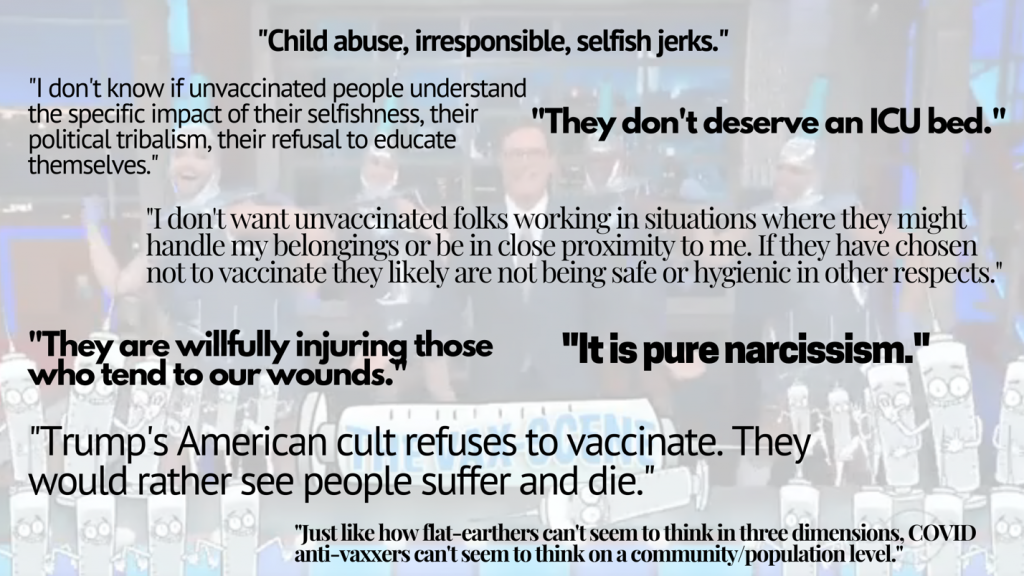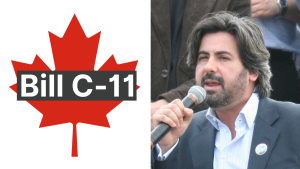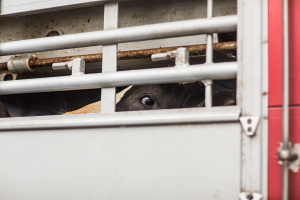
It feels like a lifetime ago that we were ‘all in this together.’ Long gone are the days of seven o’ clock pot banging, feel-good mantras, and promises of a better world. The mantra du jour is about Doing Your Part™. This mantra, regurgitated by the morally sanctimonious, is best exemplified in Starship Troopers (1997), a film that satirizes fascism and all of its discontents. The movie opens with an advertisement for the Mobile Infantry, a military unit tasked with defeating insect-like aliens known as Arachnids. In the ad, a number of young service members proudly proclaim, “I’m doing my part!” into the camera. A child is also seen regurgitating this mantra, presumably in a bid to show the effectiveness of brainwashing at a young age. The ad ends with the narrator declaring, “They’re doing their part. Are you?”
This scene was adapted directly from Triumph of the Will (1935), a Nazi propaganda film documenting the 1934 Nazi Party Congress rally in Nuremberg. Commissioned by Hitler, it’s considered to be one of the most famous propaganda films ever made.
Much like the Mobile Infantry soldiers in Starship Troopers and Nazi supporters in Triumph of the Will, the self-avowed Good People today believe they are on the right side of history. And their side of history promotes censorship, limits civil liberties, quashes dissent, and purges ideas that don’t adhere to prevailing narratives under the guise of public health. The Good People refuse to acknowledge emerging or contradicting information that might challenge their worldview, and instead resort to demonizing anyone that doesn’t blindly follow their morally righteous crusade.
These Good People typically signal to others how righteous they are by engaging in something called ‘moral grandstanding’.
What is Moral Grandstanding?
Moral grandstanding is a term coined by philosophers Justin Tosi and Brandon Warmke to describe people who care more about the social benefits of being seen as a Good Person than actually being a virtuous person. Tosi and Warmke expanded on this concept in their book Grandstanding: The Use and Abuse of Moral Talk (2020).
Put another way, grandstanding refers to the way people project the appearance of morality, not for the sake of a cause, but as a way to promote themselves, or to elevate their own social standing.
To display ourselves as good, we must express ourselves in a public space. Today, that’s commonly done online, as it is the easiest and most accessible way to attract an audience and amplify a message.
On social media, this may translate to someone regurgitating mantras about an issue, engaging in pile-ons, calling for the ‘cancellation’ of someone, or even doxxing, all in a bid to elevate one’s social status.
Thanks to the proliferation of social media, grandstanders seem to be in more abundant supply than ever.
‘A Major Source of Conflict in the World’
Research conducted by clinical psychologist Joshua Grubbs, among others, found that moral grandstanding “may be a major source of conflict in the world today.”
Some of the key findings of their research – which involved six studies, two longitudinal designs, and over 6,000 participants – include:
- Moral grandstanders tend to score high in narcissistic characteristics and also tend to report status-seeking as their fundamental social motive.
- There is no relationship between moral grandstanding and political affiliation.
- Moral grandstanders are likely to report greater moral conflict in day-to-day life and they report getting into more fights with others on social media because of their political or moral beliefs.
- They were also more likely to report antagonistic behavior over time, such as attacking others online, or trying to publicly shame someone online because they held a different moral or political belief.
Ironically, based on these studies, moral grandstanding is a better indication of whether someone is likely to be unethical and self-obsessed. As the study reveals, we should be wary of those who often resort to grandstanding.
Grandstanding as ‘Moral Contagion’
For moral grandstanding, the social payoff is huge. A 2017 NYU study found that, of half a million social media communications, the presence of moral-emotional language increased engagement by 20 percent, on average. The study’s authors call this process “moral contagion.” The same year, Pew Research Center found that social media posts expressing ‘indignant disagreement’ received nearly twice as much engagement – including likes, shares, and comments – than other types of content.
Throughout the pandemic, moral and emotional contagion skyrocketed. A March 2020 study found that social media posts exhibiting fear, sadness, and disgust were prevalent worldwide with the US, the Netherlands, France, and Switzerland showing the highest levels of disgust and anger. More specifically, studies show that posts exhibiting anger are likely to spread quicker than other emotive-posts. Anger yields more attention, and more clicks.
If moral grandstanding increases engagement, the question remains: why is it so toxic?
There are a few reasons. Firstly, moral grandstanding flattens complex issues and people. Amid the pandemic, the vaccine grandstanders have taken to regurgitating one-liners like “the Unvaccinated are selfish,” as a way to reduce others to one-dimensional caricatures to advance their own social standing. Secondly, moral grandstanding is a distraction from actually doing the work to advance a certain cause. It’s much easier to pile-on than it is to organize an action, but it’s less effective in actually effecting change. Finally, moral grandstanding can exacerbate existing divides (“You’re on the wrong side of history”). At a time when polarization is at an all-time high, we need to make a concerted effort to bridge divides, not exacerbate them.
Overall, grandstanding gives the illusion that we are advancing a cause, especially when a mob of people join in on the outrage. It’s tempting for us to stay in this space because it’s easy, and validation is never far. But it doesn’t actually move us forward, nor does it equip us with the tools to live virtuously. Quite the opposite. Moral grandstanding counterintuitively alleviates the burden of actually subscribing – and adhering – to a set of morals.
The Race to Out-Grandstand Each Other
In a Big Think video series, Brandon Warmke explains, “What happens in conversation is once people reveal their positions about how much they care about or how affected they are by some problem, you can now look like you don’t care enough. In order to beat someone else in the moral race, you have to outdo them. This often results in people taking more extreme stands than they might otherwise do on reflection, because when the world is watching, you must show that you care more.”
Over time, online opinions on the vaccine have become increasingly reactionary and extreme. The following tweets reflect Warmke’s explanation of people out-grandstanding each other:
“I think we need to start segregating.”
“Getting vaccinated is an act of humanity. Not getting vaccinated is the apex of selfishness.”
“That last 20-30% of the unvaccinated will be eliminated the hard way.”
“The unvaccinated are not equal to others.”
These aren’t carefully selected tweets, either; these opinions are disturbingly common.
Grandstanding by nature is a public action – it necessarily requires an audience to witness the proclamation, much like a preacher delivering a sermon to a watchful audience. And with social media, there is always an audience, ready to react, to shame or celebrate.
The modus operandi of these moral grandstanders is to proselytize about taking personal responsibility, despite never once feigning any concern for any other moral issue prior to the pandemic.
The Shortcomings of ‘Doing Your Part’
Perhaps the best mantra among grandstanders in the pandemic has been ‘Do Your Part.’ Despite emerging and oft-conflicting evidence of vaccine efficacy, this mantra is being used to globally dehumanize anyone who refuses to capitulate to the dominant class. Clamoring for social approval, the Good People have proudly hoisted themselves on a pedestal for everyone to applaud and celebrate.
We much prefer to deflect and sidestep blame instead of taking any personal responsibility, except when our own creature comforts are directly impacted. Publicly, many people insist they got vaccinated as an act of service for others, but when you probe a little deeper, in private, they admit they did their part out of a desire for a return to normalcy (“I want to travel,” “I want to go to brunch again”), not because they are paragons of virtue and selflessness.
If the moral grandstanders really cared about doing their part, they would practice this in other areas of their lives. But they don’t. Instead, they selectively pick and choose what Doing Your Part means. And who could blame them? When the threat of social ostracization and possible health is at risk, you will do everything in your power to stay in the in-crowd and ensure your own safety – social and otherwise.
Collectively, if we sincerely cared about Doing Our Part, our planet would look a lot different.
For starters, Western society would have an economic system that was purpose-driven, not profit-driven. We would be more egalitarian, just, and fair. We would prioritize health and prevention over medicalization and neglect. Politicians would act in the interest of their constituents, not on behalf of corporate interests. Governments would invest in health campaigns that focus on prevention, and stop subsidizing industries that make us and keep us sick. I could go on.
The Missing Step: Taking Action
On an individual level, doing your part means taking personal responsibility in all areas of your life. It’s about taking action. And we often miss this critical step. We get stuck on the first step of announcing our beliefs, but we stop short of actually living them. Grandstanding is the great paralyzer. It’s akin to people publicly announcing their goals before they’re completed, and then getting a false sense of achievement simply by stating their goals out loud. Psychologically, they’ve already reaped the award just by announcing their intention. That’s where the grandstanders get stuck.
Moral grandstanding is an ever-present, seductive force. It may feel impossible to avoid for many of us, but it is necessary to do so if we want to coexist meaningfully with each other. Next time you feel the urge to make a moral proclamation, consider whether you are actually advancing a cause, or yourself.



